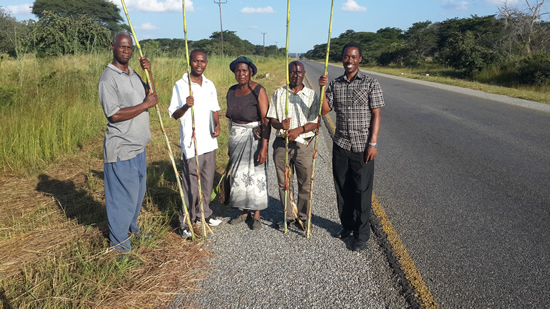Zambian farmers commend ESAFF support

22/5/2014
Ecological trainings and capacity building done by ESAFF early last year among farmers in Zambia, has started bearing fruits.
A cross section of small scale farmers in Zambia have reported a significant positive shift in their farming practices that has subsequently led to improvement of their lives.
In a recent field visit conducted in Zambia by ESAFFs Finance manager Fidelis Ndaboine, farmers expressed their gratitude towards ESAFF for the training on SEEDs, Public Expenditure Tracking Systems (PETS) and Agro Ecology. They were happy to show the results of the trainings – especially on agro-ecology and how their lives are being transformed through the practice of agro ecological farming methods.
The farmers who are mostly members of ESAFF Zambia said as a result of the trainings, they have managed to significantly reduce or eliminate totally the use of chemical fertilizers. They have shifted to the use of natural soil fertilizers which include the use of decomposed manure/animal droppings and composite.
At the farms visited no fertilizer was used in this season. Farmers said that previously while using chemical fertilizer, they only made good harvest in the first season and subsequently the harvests would drop steadily. This is a reason they adopted the agro-ecology system.
Also, to ensure maximum use of resources, farmers practice intercropping an approach that enable them to grow several crops together in one farm. This does not only ensure a good harvest of various crops from the same field, but also ensures that they will have different nutritious foods from the same farms. On the other side, intercropping is used by these farmers as a way of enriching the soil either with decomposing crop leftovers after the harvesting or by keeping the soil moist.
Also, small scale farmers are now keeping livestock like cows, goats and chicken. The aim is to collect more manure that will be used in their fields. Chicken and goat huts are built several meters from the ground so that it is easy to collect the droppings and protect the goats from the skin diseases that might be in the droppings as well as protect the chicken from wild animals.
Furthermore, farmers are now have constructed their own Seed Banks/Granaries a direct result of the training as well. With the granaries, small scale farmers in Zambia are sure of being able to not only collect quality goods from their farms but also be able to store them safely, access them in the next season for free and share them with their fellow small scale farmers for free or at a very affordable cost. This practice also helps the small scale farmers to counter the forces of the multinational hybrid seed-selling companies that are always fighting local seeds with a view of replacing them with their commercial ones.
ESAFFs trainings at Regional and then National level were undertaken from the beginning to mid 2013 and focused on the areas of Local Seeds Selection, Storage and Dissemination; Self Assessment of Organizations (SAYO), Public Expenditure Tracking Systems (PETS) and Agro Ecology. They were meant to empower farmers and their organizations on those areas.






















